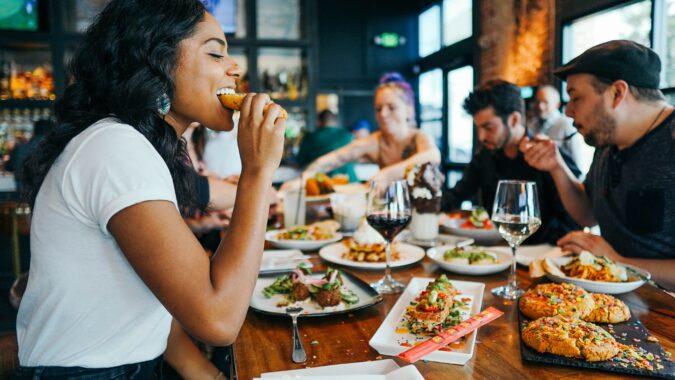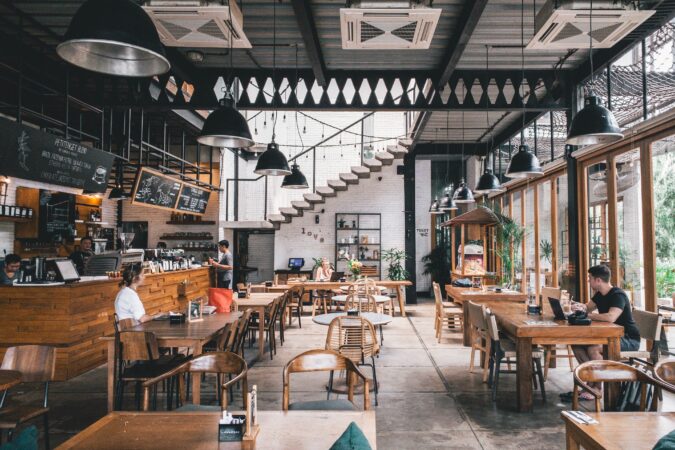
Restaurant Waste Management
It’s estimated that the foodservice industry in the UK produces more than 400,000 tonnes of avoidable waste each year. This waste brings huge social, environmental, and economic consequences. Restaurant waste management is therefore incredibly important to ensure food and other waste types your restaurant generates are managed correctly and efficiently.
Restaurant waste is unavoidable, whether it’s leftover food from customers, broken glasses, or damaged kitchen equipment. As a restaurant owner, you have a responsibility to ensure as much waste as possible is recycled, reused, and has as little environmental impact as possible.
At Business Waste we can help you develop an effective restaurant waste management plan, including collections and disposal from anywhere in the UK. Call 0800 211 8390 or contact us online for a free quote for restaurant waste removal.
Get a free quote
Get a fast FREE quote for your restaurant waste collection
- Free quote within 1 hr
- Any type of restaurant waste
- FREE bins and delivery
- We cover all of the UK
Restaurant recycling
We’re fully committed to reducing the impact that excessive waste has on the environment. This includes food waste from restaurants, which costs businesses unnecessary money to send to landfill. Restaurant food waste is organic and can still be used rather than rotting in landfill.
We provide the latest technology in food waste recycling to businesses across the country. Composting is encouraged but the other type of food waste recycling is anaerobic digestion. Here, waste food is broken down to create biogas that’s used to generate renewable energy, and biofertiliser that can be spread on fields.
Many other types of restaurant waste are fully recyclable. Some packaging waste can be converted into new materials – such as any cardboard, paper, and plastics. Glass is also recyclable and is sorted by colour, cleaned, crushed into cullet, heated, and moulded into new glass products.
We can provide your organisation with a comprehensive restaurant food waste management system to ensure as much waste as possible is recycled. The easiest way to do this is by using the right restaurant recycling bins for each type of waste you produce.

Restaurant
bins
Having the right restaurant bin for each type of waste your company produces is vital for proper storage, recycling, and disposal. There are a range of restaurant bins you should have onsite as part of an effective waste management plan. These include one or more of the following:
- Food bin – a 120 or 240 litre wheelie bin can be used to hold just food waste. It’s possible to get modified food bins with a hatch specifically designed to accept food waste and protect against pests such as gulls or rodents.
- Cardboard bin – keep recyclable cardboard materials separate. Restaurants that use lots of cardboard may want to use a baler to compress cardboard for convenient storage.
- Glass bin – 120 and 240 litre wheelie bins can be used to store glass of all colours for recycling.
- Aluminium can bin – metal cans for ingredients should be kept in separate bins for recycling.
- General waste bin – non-recyclable or reusable waste can go in a general waste bin. It’s important to educate your colleagues on what is recyclable to reduce the amount of recyclable waste going to landfill.
Restaurant bins are available in many sizes to suit everything from small cafes to large gastropubs. Find the best bins for your restaurant to ensure your waste ends up in the right place.
Restaurant waste
collection
At Business Waste, you can expect competitive pricing, reliable waste collections, a commitment to achieving 0% to landfill, free wheelie bins and a service on which you can rely. We’ll provide a free duty of care certificate for all your waste collections and replacement to damaged bins.
We work around your restaurant and arrange collections to suit your requirements. Whether you need daily, weekly, or fortnightly restaurant waste collections, our team is on-hand to help you meet your food waste management targets. We offer national waste collections, and no job is too big or too small.
Whether you’re a small village café or a city centre restaurant, and wherever you’re based in the UK, we have professional waste management services local to you. Our licensed waste carriers will collect waste from your restaurant and transport to a nearby facility for recycling or appropriate disposal.
Get a free quote today for restaurant waste collection. Speak to one of our friendly, expert team who can answer any questions you may have and advise on the best bins and collection schedule for your restaurant. Contact us online or call 0800 211 8390 today.
How does restaurant
waste collection work?
-
Select your free bins
It’s quick and easy to organise commercial waste collection for your business.
Simply start by telling us the:
- Type of waste you need removing
- Size of bins you require
- Number of bins you want
We’ll provide you with a free quote.
-
Arrange delivery
When you’re happy with the type, number, and size of free bins, tell us when you need your bins delivering.
Let us know about any access issues where you want the bins delivering – such as locked gates, access codes and times. We’ll get you up and running in no time.
-
Fill up your bin
After the free bins arrive at your chosen location, fill them up with the agreed waste type.
Make sure you remain within any weight limits for the specific waste type and bin size.
-
Get your business waste collected
We’ll arrange waste collection at a time and frequency to suit you and the amount of waste you have.
As featured in…
Restaurant waste disposal
Not all restaurant waste is food waste. Different types of waste need treating and processing accordingly. A sustainable waste management policy should dictate that additional non-food waste – such as cardboard, glass, and aluminium cans – are recycled in accordance with local guidelines. Using separate bins for each waste type can ensure appropriate disposal.
Your waste management company will transport your restaurant waste to a relevant site for recycling or disposal. We have a zero landfill policy, so aim to divert as much restaurant waste away from landfill as possible. Non-recyclables like general waste may be incinerated to create refuse-derived fuel, for example.
What happens to
restaurant food waste?

Food waste in restaurants – such as prep waste, plate waste, and spoilage – can go to an anaerobic digestion plant. Organic waste is collected from restaurants and delivered to a handling system. Anaerobic digestion is a process that involves breaking down organic matter without the need for oxygen. Instead, bacteria break the material down.
Restaurant food waste is placed in an anaerobic digester. From here, it can be converted to create fertiliser, compost, or bedding – or alternatively, it can be sent on again to a biogas handling system. The biogas produced by the food waste can be used to generate heat, electricity, or vehicle fuel.
Types of
restaurant waste
Restaurants produce several types of waste during their daily operations. Food waste in restaurants is the most common type, but there are various other kinds of rubbish related to it. The most regular types of restaurant waste and examples include:
- Preparation waste – peelings or off-cuts (like potato skins or fat trimmed from cuts of meat).
- Spoilage – items past their use-by date or ruined in the kitchen.
- Plate waste – leftover food that comes back from the plates of customers.
- Avoidable waste – excess waste generated in error (for example, producing too large a portion of a dish).
- Packaging – cardboard, plastic, glass, aluminium, and other packaging materials for ingredients.
- Old uniforms – general wear-and-tear on chef’s whites and waiting staff uniforms.
- Oil waste – cooking and other edible oils leftover during food preparation.
Read our reviews
We have used Business Waste since we have opened the restaurant last year and they always provide an excellent, efficient and professional service. I would highly recommend.Andrew Griffiths
The Harbourside Refuge Restaurant and Bar
Restaurant waste
FAQs
-
Why is it important for a restaurant to have a good waste management plan?
There are many reasons why a good waste management plan for your restaurant is crucial. Firstly, your customers care. Studies show that organisations with a sustainable approach to food waste management are likely to outperform those who don’t. With a huge customer focus on sustainability, more restaurants are implementing sustainable waste management policies.
A responsible food waste management policy also benefits the environment. If your restaurant reduces the amount of food waste it sends to landfill, it will cut the amount of carbon dioxide emitted. You could also save money with a food waste management scheme that reduces the amount of overall waste you produce.
-
What laws govern restaurant waste management?
In the UK, waste policy is driven by the existing EU Waste Framework Directive. This directive prioritises the prevention of waste, the redistribution of usable products, recycling, recovery, and disposal as the least-preferred means of dealing with waste.
MPs attempted to introduce a Food Waste Reduction Bill to parliament in 2015. However, the bill has yet to make any further progress. Instead, the government currently focuses on voluntary initiatives to reduce food waste, as opposed to taking a regulatory approach.
These voluntary initiatives are primarily led by the Waste and Resources Action Programme (WRAP) and the Department for Environment Food & Rural Affairs (DEFRA).
-
How can you reduce waste in a restaurant?
There are a few steps you can take to reduce waste in a restaurant:
- Avoid over-buying
- Correctly store food
- Practice regular stock rotation
- Label items correctly
- Inspect all deliveries
- Portion control
- Donate excess ingredients
- Incorporate leftovers
- Compost food waste
- Offer doggy bags
-
How often should waste be removed from food production areas?
You should remove waste from food production areas at least once a day and every time the bin is full – or any other waste container you use. Food waste should be removed from production areas quickly and safely to keep production areas in a clean and hygienic condition.
Regular removal of waste from food production areas in restaurants avoids any nasty smells developing and reduces the risk of contaminating foodstuffs being prepared.
-
How much food waste do restaurants produce?
In the UK restaurants produce 199,100 tonnes of food waste every year. This has a value of around £682 million, so comes at a significant cost for restaurants. While some of this is plate waste sent back by customers, research also suggests that between four and 10% of restaurant food waste occurs before reaching the customer.
Get a fast, free quote for restaurant waste removal
Get a fast FREE quote for restaurant waste disposal
- Free quote within 1 hr
- Any type of restaurant waste
- FREE bins and delivery
- We cover all of the UK